Emerging research reveals the blurred lines between humans and technology
Using cutting-edge data and analysis, this new book shares the impact of our rapidly growing digitized society.
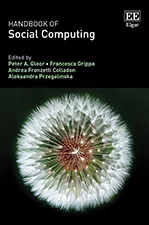
- Jazz musicians have slower heart-rates when they are “in the flow.”
- In social channels, climate change deniers tend to focus on negative communication, whereas believers skew towards more positive language.
- Entrepreneurial success is significantly reduced when we excessively employ the term “not” in our online discourse.
These new insights into human behavior are just some of the examples coming out of a recently published book detailing the impact of our digitized society. In the increasingly blurred lines between our engagement via technology versus in person, surprising insights are starting to emerge about the power of both language and medium to predict behavior and outcomes.
Northeastern University’s College of Professional Studies Associate Dean of Research, Francesca Grippa, is the co-editor of a recently published book on social computing. The Handbook of Social Computing reveals the intricate patterns of interaction between individuals, machines, and organizations.

Grippa, an expert in digital collaboration tools, human computer interaction and social network analysis, is on the frontlines of research that seeks to explore the shifting landscape of our relationship with technology.
In this most recently published book, she collaborated with a global network of peers from MIT, University of Perugia (Italy) and Kozminski University (Poland).
“The impact of our digitized society on social behavior is accelerating as we adopt new technologies across all areas of our lives,” Grippa said. “We must study the effects of human-machine interaction as they happen in order to comprehend the gains, losses, biases introduced, and the influence on decision-making processes.”
Francesca Grippa
The book covers computer science, AI, sociology, and psychology, exploring social computing from all angles. Delving into social networks, algorithmic decision-making, ethical implications of AI, data privacy, and more, The Handbook showcases how digital technologies can analyze social behavior, interaction patterns, and enhance daily life, making it essential for students, scholars, and professionals in the field of human dynamics and social network analysis.
Vivek Vaghasiya
Three words encapsulate your Northeastern University experience:
Transformative | Collaborative | Innovative
Getting a degree while life is happening isn’t always easy. How have you faced and overcome some of these challenges?
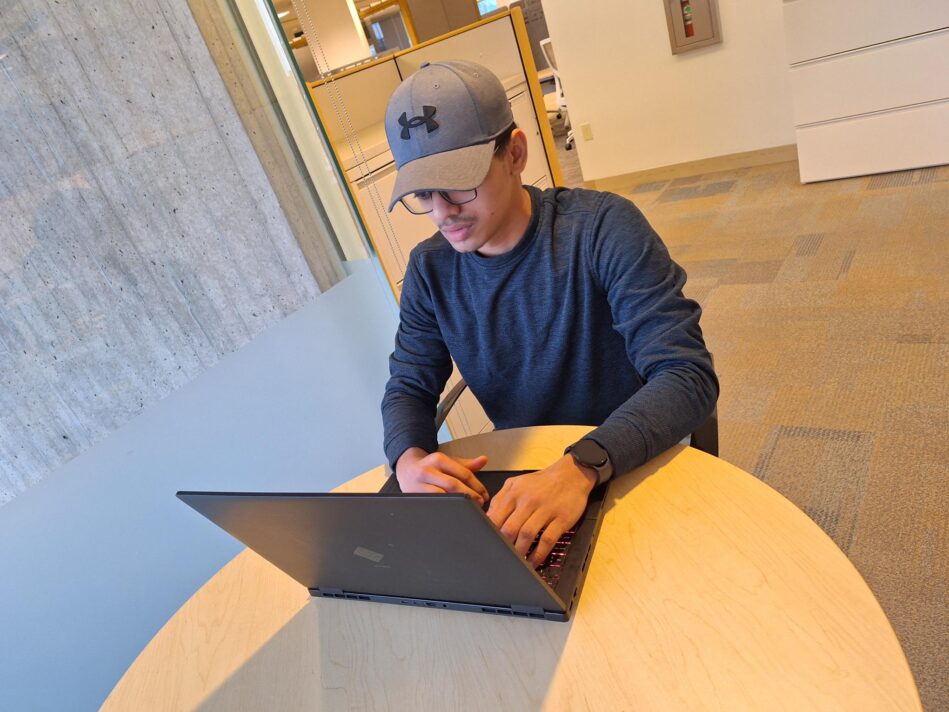
Balancing work, family, and studies presented challenges. To overcome, I prioritized tasks, established a routine, and sought support from family and peers. Time management and a strong support system were crucial in navigating these challenges.
What do you do when you aren’t working, studying, or caring for your family?
Beyond my academic pursuits, I find joy in solving Rubik’s cubes, engaging in outdoor activities, and embracing a mindset of continuous learning. Exploring new challenges and gaining insights from various experiences brings fulfillment to my life.
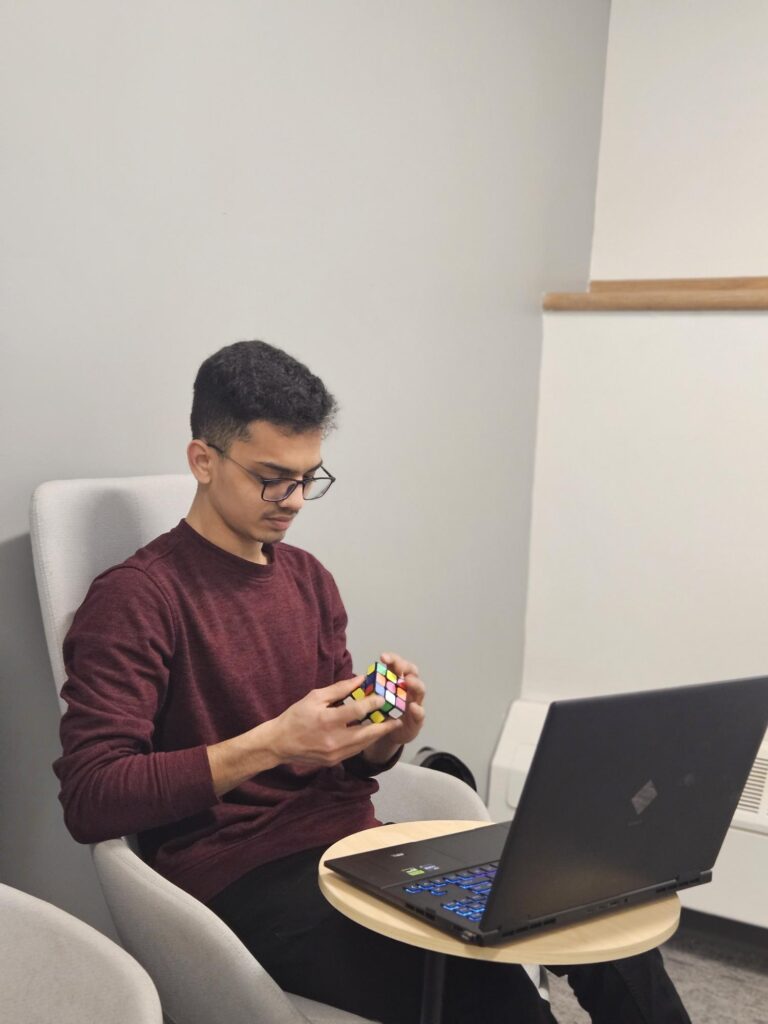
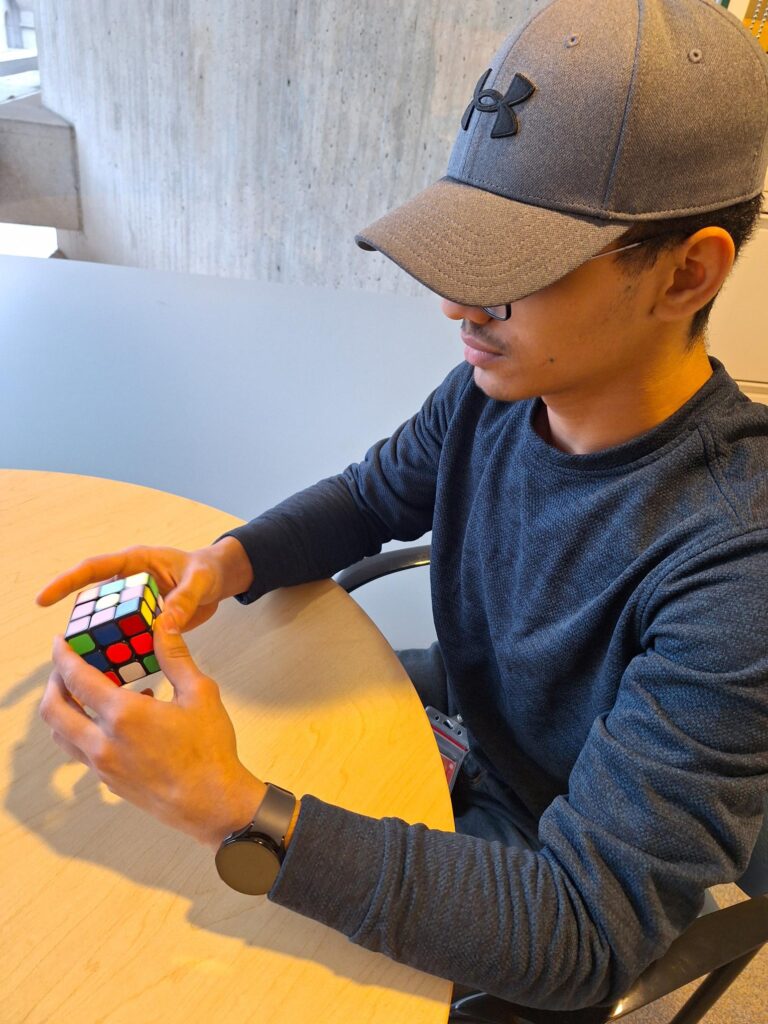
Have you learned anything about yourself along the way?
My journey at Northeastern University has been a revelation, showcasing my resilience and adaptability.
Facing academic challenges while managing other aspects of life, I discovered my ability to prioritize, stay focused, and overcome obstacles. This experience has revealed my capacity for continuous learning and growth, affirming my commitment to academic and personal development.
What advice do you have for others considering higher education — either at Northeastern or elsewhere?
As a student completing my last semester in the Master’s of Professional Studies in Informatics at Northeastern University, my advice for others considering higher education is to fully engage with the learning experience.
- Embrace challenges as opportunities for growth, actively participate in discussions, and build a strong network with fellow students and faculty.
- Leverage the resources available, including career services and networking events, to prepare for post-graduation endeavors.
- Finally, cherish the journey and take pride in the knowledge and skills acquired throughout the academic pursuit.
Where do you see yourself after graduation?
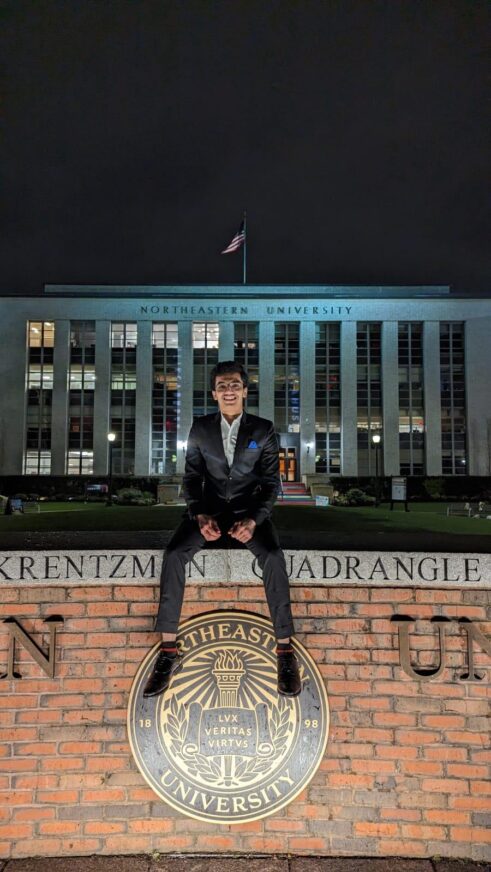
After graduation, I aspire to secure a role in data analytics or cloud computing, leveraging the skills acquired during my master’s in professional studies in Informatics.
In five years, I envision myself in a leadership position, driving innovative solutions and contributing to the advancement of technology in a dynamic industry.
A Gift Across Generations
In funding a named scholarship, Jean A. Kovacs pays forward a debt of gratitude for the life-altering education she received at Northeastern
When Jean A. Kovacs, who graduated from Northeastern’s University College in 1983, left foster care in Wilmington, MA, at age 18, the career paths for a woman of her background looked extremely limited.
“As a female,” she told students and families at the 2022 CPS Undergraduate Scholarship Celebration, “you were either going to be a nurse or a teacher, or maybe you’d get a job as a clerk, typist, or a secretary.”
Kovacs started as a clerk-typist at a small company near Wilmington, and soon fell in love with the world of business. She knew she would need an education to rise in the field, and she started taking evening classes—marketing, computer science, accounting—at Northeastern’s Burlington campus. A few years later, thanks to the availability of evening and weekend classes, she finished her degree.
“I was learning things in class that I could then bring and apply at work, so it made the learning process so much more real for me,” Kovacs said. “My job got better, my work performance got better, but also the effort that I put into my classes got better, because I could see the application.”
“That,” she said, “is what I love about the College of Professional Studies.”
Decades later, the entrepreneur, venture capitalist, angel investor, and onetime finance major was present at the Scholarship Celebration to present the inaugural Jean A. Kovacs Scholarship, an endowment she established in 2020 to support female students interested in pursuing careers in business or STEM (science, technology, engineering and math). She has come a long way from those early days, and now she wants to pay it forward.
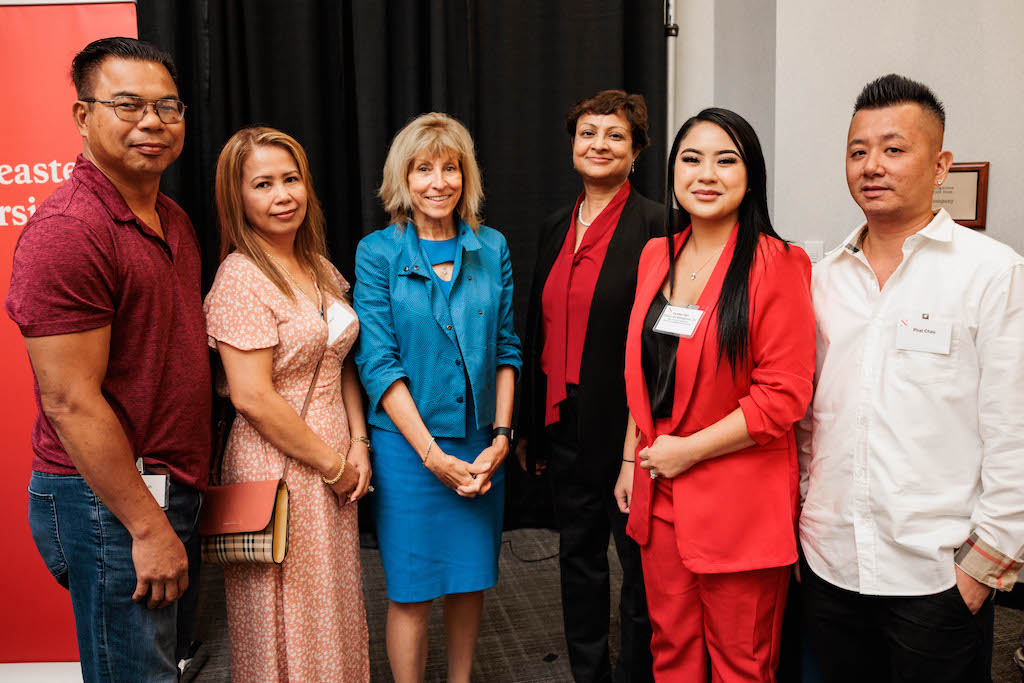
“My head and my heart go out to you and all the work you’ve done,” she told students. “My story is probably very similar to a lot of you.”
Among those in the room was Cynthia Thin, ’23, a finance and accounting management major and the first recipient of the Kovacs Scholarship. The daughter of Cambodian immigrants, Thin worked from a young age to support herself and her family. At 16, she recalled in the speech she gave at the reception, she was working seven days a week, even as she maintained her studies in high school.
One reason Northeastern has been such a good fit, Thin says, is that it has offered the flexibility her family needs. On a typical day, she’ll help her partner with his bakery until 7 a.m., arrive at the office by 8 a.m., work until 5 p.m. and then attend class in the evening. When she completes her degree next spring, Thin plans to enter Northeastern’s accelerated nursing program so that she can combine skills in business and healthcare to start her own beauty and wellness salon.
“I still have a lot of work to do before I can achieve that goal,” Cynthia said. “But I’m grateful to have mentors and role models to motivate me. As a recipient of the Jean A. Kovacs Scholarship, I have Jean as a role model now. It’s exactly the kind of encouragement I need. Thank you [Jean] for your generosity and example.”
Reflecting on her scholarship in her remarks at the reception, Kovacs said she was thrilled to meet Thin, and that the experience “sort of brings everything back full circle.” As she introduced Thin, she also offered her an invitation to continue the circle of giving.
“I’d also like to challenge you that in 20 or 30 years you’re up here because you’ve established the Cynthia Thin scholarship,” she said with a smile. “Congratulations.”
Gifts to support scholarships for CPS undergraduate students in any amount can be made by clicking here .
Small Business Owner Makes Big Move in Support of Ukraine
For more than ten years, College of Professional Studies alumna Natalie Kaminski ’06 owned a successful software company outside of Moscow. But when Russia attacked Ukraine earlier this year, the childhood she spent living in Ukraine spurred Kaminski’s decision to quickly help dozens of employees and the business move across the border to Georgia.
After a narrow escape, the company and its employees are making their way in a new home.
Northeastern and Code Fellows Partner to Provide New Pathways to Bachelor’s Degrees in Information Technology
Code Fellows is partnering with Northeastern University College of Professional Studies to provide learners from any background a pathway to obtain their Bachelor’s Degree in Computer Science.
Through this partnership, students and alumni who finish one of Code Fellows’ rigorous programs are able to transfer up to 24 credits of coursework toward completion of a Bachelor of Science in Information Technology at Northeastern’s College of Professional Studies, giving them college credit for their learning through Code Fellows’ courses.
Code Fellows and Northeastern University believe tech careers should be open to everyone. Through the power of partnership, they are leveraging their collective strengths to ensure learners not only have the opportunity to gain rewarding new careers in tech, but also have the opportunity to obtain a bachelor’s degree in computer science from a top tier university.
“We believe everyone should be given the opportunity to obtain a bachelor’s degree. Historically, this has not been the case and many learners have been systemically prevented from attending prestigious colleges and universities. Now that we are partnering with Northeastern University, we can ensure that everyone regardless of background, finances, or life challenges has a pathway to getting a bachelor’s degree from a top tier university,” said Mitchell Robertson, Code Fellows’ VP of Business.
Code Fellows and Northeastern College of Professional Studies share a common goal of building diverse and inclusive communities where individuals are valued for their uniqueness and are provided opportunities to succeed. Both see diversity of thought, culture, and viewpoint as essential to learning and growth, and by focusing on this they can provide learners with technology skills for a better life, for a better community, and for a better world.
“We’re thrilled to be partnering with Code Fellows to provide a pathway for their learners to complete their Bachelor’s Degree at Northeastern CPS. By valuing the skills and knowledge they gained at Code Fellows, learners will start CPS with 24 credits towards their Bachelor’s Degree. This lowers the cost of learning and speeds time to degree. That’s a value to learners that the partnership makes possible,” said Molly Smith, PhD, Associate Dean, Opportunity Pathway Programs, Northeastern University College of Professional Studies.
The rigorous academics and focus on experience-based learning of Northeastern’s bachelor’s degree completion programs aligns with Code Fellow’s “learn-do-learn-do” style of education: both are focused on imparting product sensibilities, the most relevant practical skills, and the ability to work in technical teams to give graduates a competitive career advantage. The Bachelor of Science in Information Technology program offers students flexible program formats to allow them to complete their coursework when and where it is most convenient for them. Additionally, with scholarships available for qualifying applicants worth up to $15,000, Northeastern helps put earning a bachelor’s degree within reach.
Northeastern University has a long-held reputation as a leader in education that supports career aspirations. The knowledge earned at Code Fellows and Northeastern will help equip students for some of the highest demand jobs. Five of the 10 “best jobs in 2022” are in the IT sector, according to Burning Glass, the job market analytics firm, and federal data from the US Bureau of Labor Statistics predict that employment of computer and information technology occupations will grow 13 percent from 2020 to 2030, faster than average for all occupations.
About Northeastern University College of Professional Studies
The College of Professional Studies is the largest of the nine colleges of Northeastern University, a nationally ranked private research university in Boston, Massachusetts. Founded in 1960, the College provides lifelong experiential learning that unleashes the capacities of aspiring individuals in all stages and walks of life. The College teaches undergraduate, graduate, and doctoral students on campus and online in more than 90 programs.
About Code Fellows
Code Fellows is an internationally recognized technical skills training academy, delivering high-quality live instruction both online and in-person to people from all backgrounds. Learners are guided toward vocational change and life transformation through software development, technical operations, cybersecurity, and career training. Code Fellows provides people from all backgrounds the opportunity to change their lives through fast-paced, career-focused education. They shape passionate learners with immersive training to meet industry needs and improve diversity in tech employment. They are more than honored to announce that their recently audited employment results show that their alumni have achieved an outstanding 93% In-field Employment Rate. According to this study conducted by Switchup, Code Fellows was the number one ranked program for landing a job at a major tech company.
Annual Undergraduate Scholarship Reception Honors Students, Benefactors
Supporting scholarships is all about giving back. Dozens of Huskies who received scholarships to support their education—dating back to the time of University College in the 1960s—have made the choice to establish named scholarships to support future generations of students following in their footsteps. Paying it forward is a long-standing tradition at the College of Professional Studies; so, it’s no surprise that in her speech at the annual undergraduate scholarship reception on August 23, 2022, Jean Kovacs, UC’83, challenged her own named scholarship recipient to do just that in the future when she is able.
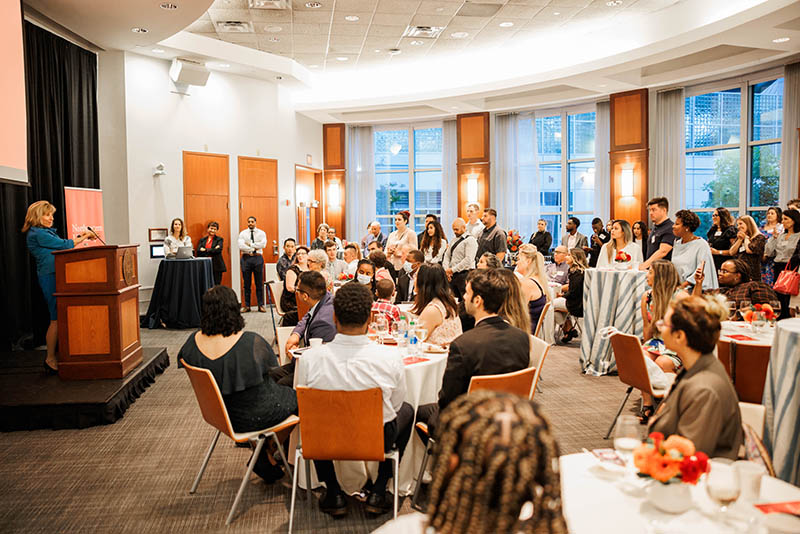
Cynthia Thin, Class of 2023, is the inaugural recipient of the Jean A. Kovacs Scholarship, an endowment that Jean established in 2020 to support female students interested in pursuing careers in business or STEM (science, technology, engineering and math). Cynthia happens to be interested in both. Once she completes her degree in Finance and Accounting Management next spring, Cynthia intends to enter Northeastern’s accelerated nursing program so that she can combine skills in business and healthcare to start her own beauty and wellness salon.
“I still have a lot of work to do before I can achieve that goal,” Cynthia said in the speech she gave at the reception. “But I’m grateful to have mentors and role models to motivate me. As a recipient of the Jean A. Kovacs Scholarship, I have Jean as a role model now. It’s exactly the kind of encouragement I need. Thank you [Jean] for your generosity and example.”
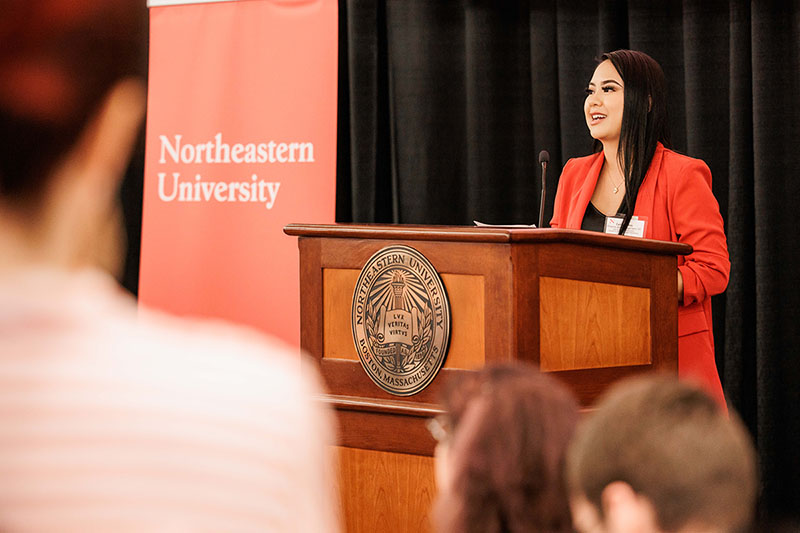
The financial benefit of a scholarship is most often compounded by the human connection and encouragement of a benefactor. “There is no doubt in my mind that Cynthia has the passion and drive to achieve the lofty goals she has set for herself, just as Jean did before her,” added Dean Radhika Seshan as she closed the annual reception.
The College of Professional Studies celebrates 224 undergraduate students who received scholarships totaling $421,000 for the 2022-2023 academic year, thanks to the generosity of alumni and friends of Northeastern.
Easing Supply Chain Disruptions With Informed Decision Making
Recent global shocks such as the COVID-19 pandemic and the war in Ukraine have exposed the fragility of the global supply chain. Northeastern University-Toronto sat down with Ammar Aamer, associate teaching professor in the Master of Science in Project Management program at the College of Professional Studies, to talk about the role that digitalization can play in increasing the resiliency of the supply chain—and the exciting research that he and his students are conducting in this critical area.
With a Boost From the Akamai Foundation, Northeastern, Bunker Hill Community College, and Middlesex Community College Kick Off Initiative to Strengthen Pathway From Community College to the Tech Sector
‘Earn and learn’ initiative seeks to open doors, expand equity in computing.
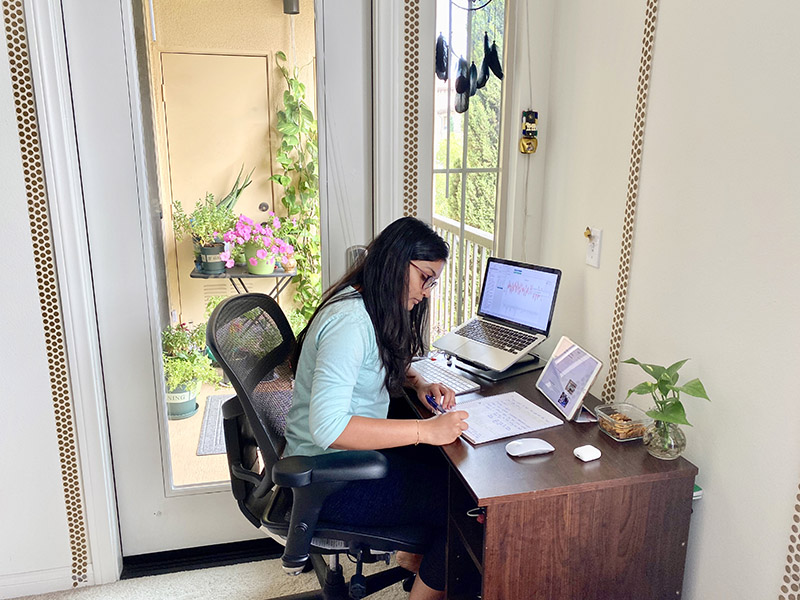
Northeastern University, Middlesex Community College, and Bunker Hill Community College are launching the Associate to Master’s degree Pathway for Technology (A2M4Tech) program, an innovative and affordable pathway to the technology sector for learners who begin their undergraduate education in community college. The development and startup of the program are supported by a $750,000 grant from Akamai Technologies Inc.’s Akamai Foundation. Dubbed “earn and learn”, the program addresses institutional barriers that have long slowed progress in achieving equity in computer science, interleaving study and work by providing full-time employment opportunities for students while they pursue their degrees.
“The Akamai Foundation is pleased to fund the Pathway for Technology (A2M4Tech) to expand and diversify the tech talent pool and support Northeastern University’s commitment to experiential education,” says Kara DiGiacomo, Director of Corporate Philanthropy, Akamai Technologies.
“The A2M4Tech program is an accessible pathway to an in-demand field with high-paying jobs,” says Dr. Liz Zulick, Director of the Lowell Institute School and Associate Dean for Research, Innovation, Discovery and Entrepreneurship at Northeastern University College of Professional Studies. “Many of our students have to work full-time while attending classes and completing coursework. Consistent employment is a necessity and, ideally, we want that job to be in the student’s field of study. Thanks to this grant from the Akamai Foundation, we can now create a pathway that works for adult learners, allowing those who otherwise might not be able to afford the cost or time investment of a degree, to enter the tech sector. Importantly, this pathway also offers industry partners a talent pipeline that is diverse in terms of race, ethnicity, and income—something that is an increasingly high priority for many employers. So, this program is a true win-win.” A2M4Tech is modeled on a similar program developed by Northeastern and Middlesex in the biotech sector.
As the U.S. job market has shifted dramatically toward STEM fields over the past half-century, the share of jobs requiring postsecondary education has doubled. This poses a vexing challenge in an economy where, according to a study published by the National Bureau of Economic Research, fully half of individuals from high-income families have a bachelor’s degree by age 25, while just 10% of those from low-income families do. According to the Postsecondary Value Commission, students of color and students from low-income backgrounds are concentrated in for-profit institutions and two-year colleges—where they are more likely to leave in debt but without a degree. Because variations in attendance, completion, and post-college outcomes by race, ethnicity and income are especially divergent in STEM fields that offer some of the best job opportunities, the A2M4Tech program is specifically designed to support students from underrepresented populations looking to gain credentials in computer science.
“The technology field should be accessible for everyone,” says Carla Brodley, Executive Director of the Center for Inclusive Computing (CIC) at Northeastern. “Removing the barriers that contribute to exclusion in computing is an urgent priority, and the A2M4Tech program is an opportunity for industry partners to take a leading role in achieving that goal. I think Massachusetts is the perfect place to pilot this approach given the Mass Technology Leadership Council’s Tech Compact for Social Justice, which more than 90 Massachusetts companies signed in summer of 2020 when it launched. ”
“Middlesex is excited to expand our partnership with Northeastern to offer another rewarding and relevant pathway to STEM for our diverse population of learners,” said Kathleen Sweeney, MCC’s Dean of STEM. “As there are a number of high-quality STEM positions available across Massachusetts, access to education has never been more important. We are proud to not only be a starting point for so many students, but to be able to guide them on their paths to stable jobs and incomes, and brighter futures.”
The donation by the Akamai Foundation provides scholarships, wrap-around student support services, career coaching and mentorship, curricular updates, and financial support for day-to-day expenses such as textbooks and transportation. This allows Northeastern to leverage its 120+ year commitment to experiential education via its co-op program and focus on identifying industry partners that will provide the employment opportunities for the A2M4Tech students.
“Bunker Hill Community College is thrilled to partner with Northeastern University in our commitment to investing in our communities and advancing equity by providing quality education and connecting students to high-demand technology fields,” said Austin Gilliland, BHCC’s Dean of Professional Studies.
“The unequal rates of completion and entry into the tech industry that have prompted the creation of this program are by no means unique to Boston,” Zulick said. “Finding effective models that integrate learning and working, rather than just alternating the two, should be an urgent national priority. Given Akamai’s global footprint and overlap with Northeastern in locations such as San Jose, Vancouver, and London—we see a big opportunity to grow the impact.”
The first cohort of students in the A2M4Tech program will launch in fall of 2022, and Northeastern is currently recruiting industry hiring partners. Please reach out to Liz Zulick.
Dawn of the Global Consensus Toolkit
Diplomacy meets equity as an interdisciplinary partnership yields a powerful new platform aimed at leveling the policy-making playing field.
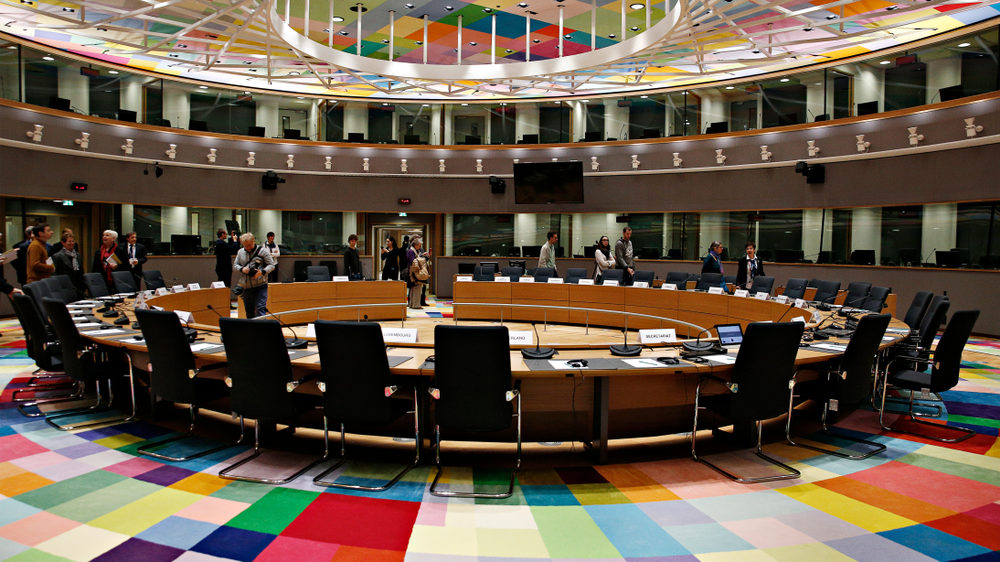
On its face, the request from the U.S. Department of State seemed simple: Design a digital dashboard to allow officials to quickly research how often United Nations (UN) member nations had sided with the U.S. on various topics. Wondering how often the votes of the U.S. and members of the G-77 have coincided on issues related to human rights? Nuclear arms and disarmament? Decolonization? Plug in the variables and find out.
In practice, it was anything but.
“From a policy perspective,” Associate Teaching Professor Fiona Creed says, “people often think there are a lot of possibilities, and there are. But then you add the data piece into it, and you realize—this may not be as straightforward as we think.”
It was the spring of 2020, and Creed had secured a project via the State Department’s Diplomacy Lab program, a public-private initiative wherein the federal agency partners with colleges and universities, outsourcing research and other tasks related to foreign policy challenges by offering student teams, led by faculty experts, the opportunity to wrestle with real-world problems.
For this particular project, the charge was to find a way to measure and visually render the degree to which members of the Group of 77 developing nations (a bloc that now numbers 134 and includes Cuba, Iran and Afghanistan) had voted in alignment with the U.S. Creed found the problem fascinating, and she knew her students in the College of Professional Studies’ Global Studies and International Relations graduate program would embrace the challenge.
She also knew they couldn’t do it alone.
The task was perfect for Creed’s students because it required researching, developing, and applying a sophisticated understanding of international relations to categorize UN resolutions and group them by topics and subtopics. But it also entailed logging the votes on each resolution, building digital dashboards, and figuring out the best ways to graphically render the decades of information contained in the UN voting history. Massive amounts of data were involved. The numbers would have to be crunched, the code written, and a design that would let users easily turn the figures into images such as bar graphs would have to be conceived and executed. All of it would take some serious expertise in programming and data analytics.
A long-awaited collaboration
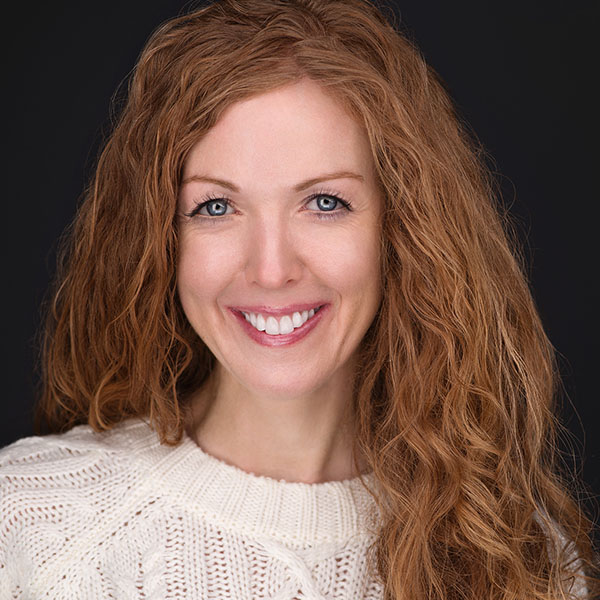
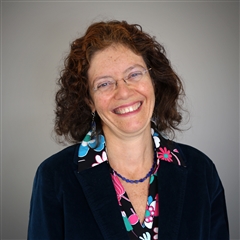
Luckily, Creed knew just whom to call—in fact, that person was sitting right across the hall.
“Alice is very good at explaining to me how the data works and what’s actually possible,” Creed says of her colleague and office neighbor Alice (pronounced ah-LEE-say) Mello, an assistant teaching professor in the Master of Professional Studies in Analytics program. The picture that emerges as the two describe working together is a kind of collaborative counterpoint, with Creed the visionary international affairs expert and Mello the technical miracle worker—and grounding voice of reason.
“I come in with big ideas,” Creed says. “‘This is amazing! We can definitely do this! Absolutely! Consider it done!’ And then Alice is right there saying ‘No, actually, that’s not going to work, because the data just won’t support it—but here’s what will work.’”
That synergy, rooted in shared experience and complementary expertise, has been years in the making.
Creed, whose career has encompassed research, diplomacy, entrepreneurship and the nonprofit sector, was born in Ireland and started her professional life as a policy analyst at the EU Delegation to the United Nations in New York City. She later served as executive director of the United Nations Association of Greater Boston, where she oversaw operations including Model UN, the Association’s flagship experiential learning program focused on diplomacy and global issues. For her PhD in European Studies at University College, Cork, Creed studied EU coordination at the UN.
Mello, born in Brazil, began her professional career as a programmer while still a student at the Federal University of Bahia in Salvador, Brazil. She went on to work as a software engineer for Coelba, the big utility that distributes power in Bahia state. She later developed database management applications for the Massachusetts Water Resource Authority, worked as a programmer at MIT and co-developed a technology-in-education consultancy. Her PhD from Tufts University is in Education, Technology, and Drama.
When the expatriates met at Northeastern, Mello says, they quickly found common ground, and before the Diplomacy Lab opportunity arose, they had long imagined working on a project together.
“I had a project with the UN in 2018,” Mello says, “and I approached Fiona about how we might make it sustainable, but we didn’t really end up pursuing it. Another time she asked me to present to students who needed data analytics on their projects. So we’ve had a few times that we’ve tried to work together, but nothing really went up. This time, it did.”
With students in their capstone classes and other courses onboard, the two educators launched the project. Soon, as global studies students sifted through thousands of UN resolutions, applying their knowledge of international affairs to categorize each, data analytics students began building the user dashboard and writing the code to generate a powerful, intuitive interface that would allow end-users to easily parse the information to suit their needs. As the students worked, their collaboration began to mirror that of their professors.
“One of the most interesting pieces for us was hearing the students interact,” Creed says. “The identification of the countries was becoming so fluent for the data analytics group that they were starting to notice things about the politics and to ask questions that the global studies students could answer. It was brilliant to see that come together.”
“For the analytics students it was super-interesting,” Mello adds, “because it’s basically getting qualitative data and transforming it into something quantitative. If it’s all quantitative, you punch in the numbers—and I’m not saying it’s easy—but you can do it. But to get qualitative data and then to transform that into quantitative, to look at patterns and have some basis for it statistically, that is where all the magic and the synergy came in.”
Inherent uncertainty
As students labored to build something new, part of the challenge became grappling with ambiguity. When you’re inventing something, it can be hard to know what success—or a good grade—will eventually look like. But learning to tolerate the uncertainty inherent in such a process, Creed and Mello say, actually helped students explore new modes of thinking.
“Working logically, analytically, but also understanding the process isn’t having all the answers, it’s figuring them out—I had never had that kind of thinking until I did my PhD,” Mello says. “But in this project, we tried to bring that to these students, because that’s the thinking that they need to do well to be good data scientists and good data analysts. It really resonated for me, to see them learning that way.”
Creed and Mello also note that, in some ways, the composition of the classes doing the work reflected the subject of the work itself.
“I had students from India, Ethiopia, a student based in Kuwait, and one in Qatar, who is in the U.S. military,” Creed says, “and then Alice’s group had students from China, India, and the U.S. When you’re looking at policy making and analyzing all of what was in front of us, it was really interesting to get the perspectives of students who were from the countries that they were working on and seeing patterns, or not seeing patterns, and then we could tease out afterwards with them, ‘What do you think of that?’ or ‘Why is that?’”
One of the most interesting developments, the researchers say, was the shift from a U.S. focus to a more global perspective. Engendered in conversation with their UN contacts, in the perspectives of students from diverse countries of origin, and through their own lenses as immigrants, that shift came to reflect the deepest mission of the portal that would eventually be known as the Global Consensus Toolkit.
“A primary motivation for having a public access portal,” Creed and Mello write in the introduction to the visual analytics platform they and their students developed, “is to level the policy-making playing field.”
“There was a lot of data,” Creed says. “We worked with it, Alice and I, plus multiple teams of students. There are many departments of foreign affairs or governments, globally, that just do not have the time or money to dedicate to getting into the UN digital library, downloading everything, coding it, reworking it—and so that’s where coming back to that original Diplomacy Lab ask, that we saw the relevance of this material being publicly available. And the usefulness of it.”
Big audience, broad applications
That usefulness, Creed and Mello say, reaches far beyond international affairs. Although the Toolkit was designed with diplomats in mind as the end-users, the information it contains—and the lenses it provides for sorting and analyzing that information—might easily be applied in the work of researchers, think tanks, nonprofits, advocacy groups and policy decision-makers or anyone else seeking to accurately chart the tides of power and the relationships among nations over the past 20 years.
From their “client,” the Global Consensus Toolkit earned rave reviews. When students presented at the State Department via Zoom, the reception was unequivocal. A senior UN official in attendance, Creed reports, was astonished.
“He said, ‘That is amazing. We have tried to work with this data before and we have never seen anything like that,’” Creed says. On the spot, he proposed a continued collaboration, one that would involve digging even deeper—and would not require a new application through the Diplomacy Lab program. With that project in mind, Mello and Creed plan to align their capstone classes this winter and next spring. For now, they are delighted to invite the world to use the free, online tool they and their students developed.
“Fiona told me in the beginning that nobody had done this work before,” Mello says. “There have been some static models of voting patterns, but we were able to create an interactive dashboard that is really functional—and that, nobody has done.”
Graduation 2021
College honors master’s and doctoral graduates, citing ‘ingenuity and resilience’, with ceremonies that emphasize service, perseverance and experiential learning.
Doctoral Hooding
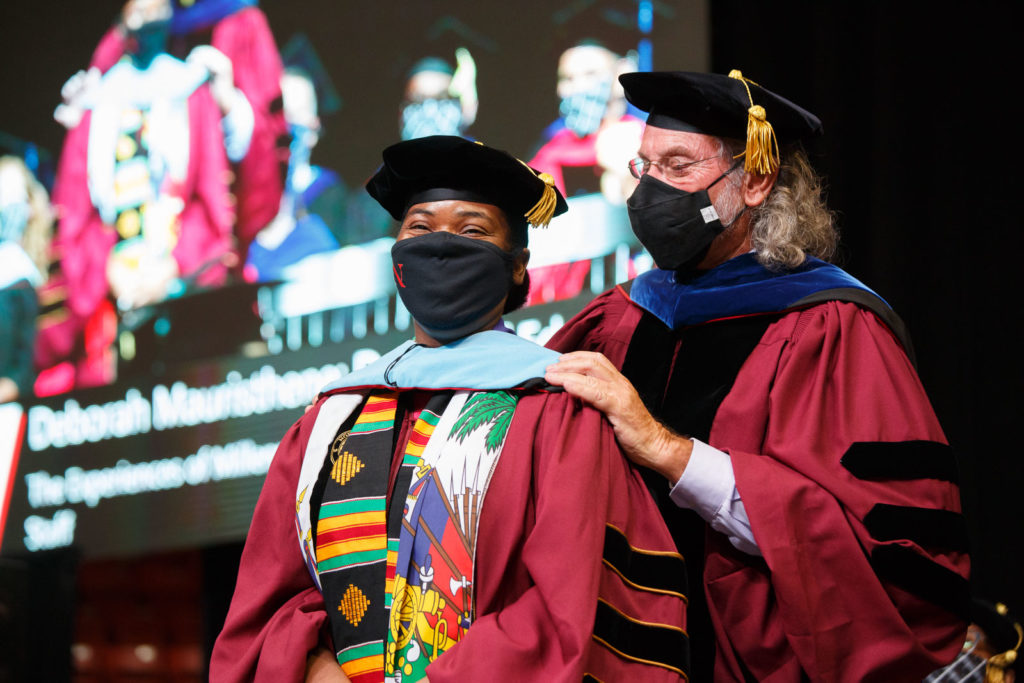
The words of Brent Musson, (Doctor of Law and Policy ’20), captured the mood at the Doctoral Hooding and Graduation Ceremony of the College of Professional Studies in Matthews Arena Sept. 9—and at the Master’s Graduation Ceremony in the same location the following day: “Humanity at its best,” the 2020 Dean’s Medal recipient said in his remarks to the successful doctoral candidates, “is humanity in gratitude.”
Gratitude was in abundance both days as faculty, administrators, students and their families—as well as friends of the College worldwide via livestream—celebrated the graduates’ achievements in the face of extraordinary challenges. Speakers at the ceremonies praised the degree recipients for their perseverance in scholarship despite a global pandemic, their passionate commitment to learning and their determination to address real-world problems in their project-based learning and research.
‘Both humility and pride’
In his opening remarks on Sept. 9, Provost and Senior Vice President for Academic Affairs David Madigan, Ph.D., welcomed the College of Professional Studies (CPS) community, expressed his faith in the graduates’ future success and his pride in their accomplishments and celebrated their membership in Northeastern’s “powerful knowledge network” dedicated to the dream of a more just and equitable society. He was followed at the podium by Interim Dean of CPS Dr. David Fields, who noted the unusual degree to which CPS students break down the barriers between work and learning.
“Our doctoral students are already fulltime professionals and leaders in their fields,” Dr. Fields observed. “In true Northeastern fashion, they are researching what they live, and living what they research, every day.”
Dr. Fields went on to explain the significance of the hooding ceremony—so-called because doctoral students traditionally have the hoods of their academic regalia lifted over their heads by faculty.
“The symbolism of the hooding ceremony at our doctoral commencement honors both the doctoral candidate’s work and the network of relationships that make that work possible,” Fields said. “[It] embodies both humility and pride, on both sides of the relationship, as faculty members welcome a new peer into their community.”
Faculty speaker Dr. Mounira Morris (B.S. ’91, M.S. ’95), assistant teaching professor and the co-lead for the Master of Education in Higher Education Administration program, offered her congratulations to the graduates and acknowledged the special challenges that had arisen during their studies, including the pandemic and the persistence of racial injustice. She quoted James Baldwin, noting his achievements as a playwright, novelist and civil rights activist: “Not everything that is faced can be changed, but nothing can be changed until it is faced.”
“To me,” Dr. Morris said, “this means that at times we will collectively endure hardship; however, we can use these experiences, especially as doctors, to offer wisdom, hope, and a better path forward.”
A longtime leader in diversity, equity and inclusion (DEI)—and currently working with colleagues at Northeastern to develop a new academic credential in DEI—Dr. Morris emphasized the power for good inherent in the attainment of an advanced degree, encouraging the graduates to find creative solutions to the challenges in their professions, communities and personal lives.
“We, as faculty,” she said, “ask that you take your research, and go out and change your world, your profession, your workplace and make it just a little bit better than before. We, as faculty, believe you can persevere and persist. We know you can.”
Intellectual explorers
Dr. Musson, whose acceptance of the 2020 Dean’s Medal had been previously postponed due to Covid-19 precautions, suggested in his remarks that the attitude of an academic researcher is “not that of an author or maker, but rather that of an explorer.” He praised the selflessness and commitment of his peers and made a critical distinction between an undergraduate education—which, he said, “teaches a student how to learn”—and a graduate education, in which students learn “to use tools … to solve other people’s problems” and to create value, going “from inward-facing to outward-facing.”
He noted that, soon after a doctoral candidate’s academic journey begins, “we become acutely aware of what we’re signing up for; to spend the next few years engaged in the most rigorous intellectual exercise of our lives, to extract a single, pure, tiny drop of insight to ever-so-slightly raise the sea level of the ocean of human knowledge.”
And he described a moment of inspiration in what he termed a spiritual awakening: a street soccer game he had observed in West Africa more than a decade earlier, where, when a beautiful goal was scored, both teams celebrated. Drawing a parallel between the players’ selfless joy and the academic community he had found at Northeastern, Dr. Musson said, “These happy boys had purpose; and that purpose made them work together, against all odds to orchestrate a moment of greatness—a moment of pure, unselfish greatness.
“I’ve never circled a soccer field making wings with my arms,” he continued, “but research has made me part of our team, and this humbling honor is our winning goal.”
As Dr. Musson finished his speech, the audience rose to deliver a sustained standing ovation.
At the conclusion of the ceremony, Dr. Madigan returned to the stage to offer closing remarks, praising the successful doctoral candidates for their “drive, dedication and sense of purpose.”
“The world is ever changing,” he said, “but you are prepared to meet—and conquer—its challenges.”
Master’s Ceremony
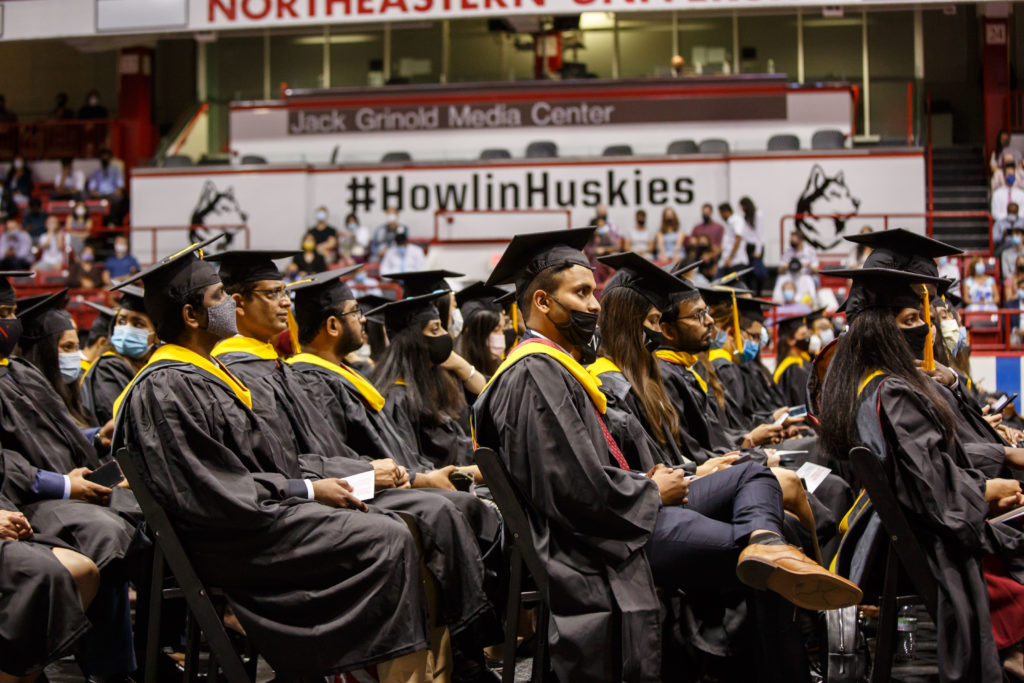
‘A day full of promise’
The following afternoon, Dr. Madigan returned to welcome master’s graduates to the arena on “a day full of promise.” He praised their “clear-eyed determination, discipline and hard work,” and offered special recognition to the faculty who, he said, by guiding the graduates to success, “have strengthened a legacy of knowledge and helped shape the future in scores of fields of professional endeavor.”
Following Dr. Madigan’s remarks, Dr. Fields spoke, celebrating the graduates’ global engagement and their cultivation of “the cultural competencies needed for a lifetime of contribution in a fast-paced, diverse, global society.” He went on to emphasize the benefits of their embrace of experiential learning, noting that in so doing, they had “addressed pressing, real-world problems” and become “well-prepared to lead from experience in the workplace.”
Dr. Fiona Creed, associate teaching professor and faculty director of the Global Studies and International Relations program, next introduced student speaker Ebony Small, ’21.
Reflecting on a year of adversity, Small observed “the pandemic itself could neither make nor break us” and asked graduates to consider the ways in which the challenges of the past 18 months had taught them to know their own courage, ambition, and steadfastness.
“We did not make it to this moment merely because we just-so-happened to survive a global pandemic,” Small said. “No, we made it here because we made the choice to value education and then fiercely pursued it. My dear friends and colleagues, despite the unexpected challenges of this year, we thrived. We grew. We changed.”
“This,” she concluded, “is what it looks like to turn a choice into a change. This is what it looks like to champion growth. Congratulations.”
From humble roots to world-renowned
Following an introduction by Dr. Earlene Avalon, associate professor and lead faculty for Health Administration and Health Sciences, graduation speaker Carl H. Whittaker, a philanthropist whose life path has spanned business, engineering and music, addressed the community.
A director of the Herb and Maxine Jacobs Foundation—which supports the College’s “A2M” or “Associates to Masters” program, offering an accelerated pathway from a community college associate’s degree to a bachelor’s at the College of Professional Studies and a master’s degree in Biotechnology at Northeastern’s College of Science—Whittaker began by invoking Northeastern’s origins as a vocational school offering evening classes, run by the YMCA.
“We all know that Northeastern is now a world-renowned university, highly ranked in many fields,” Whittaker said. “But inside this world-class institution is still the legacy of that 1898 night school.”
Whittaker linked this history with Northeastern’s emphasis on internship experiences, co-ops, and other programs that connect students to “great employers and great jobs.” He applauded the graduates for their effort and creativity in juggling jobs, families, and studies, urged them to embrace the role of mentor for other aspiring scholars, and invited them to fight income inequality—as his foundation does in part by supporting scholarships at Northeastern.
“I am inviting each of you to join my fight against economic inequality by encouraging at least one or two others to join you in earning an advanced degree,” Whittaker said. “Just be ready when you see a family member or neighbor who would value your guidance. Your friendly support might be thing that leads someone to a more prosperous and fulfilling life.”
The Doctoral Hooding and Master’s Ceremony were livestreamed from Matthews Arena. Click the links below to view recordings of the ceremonies.
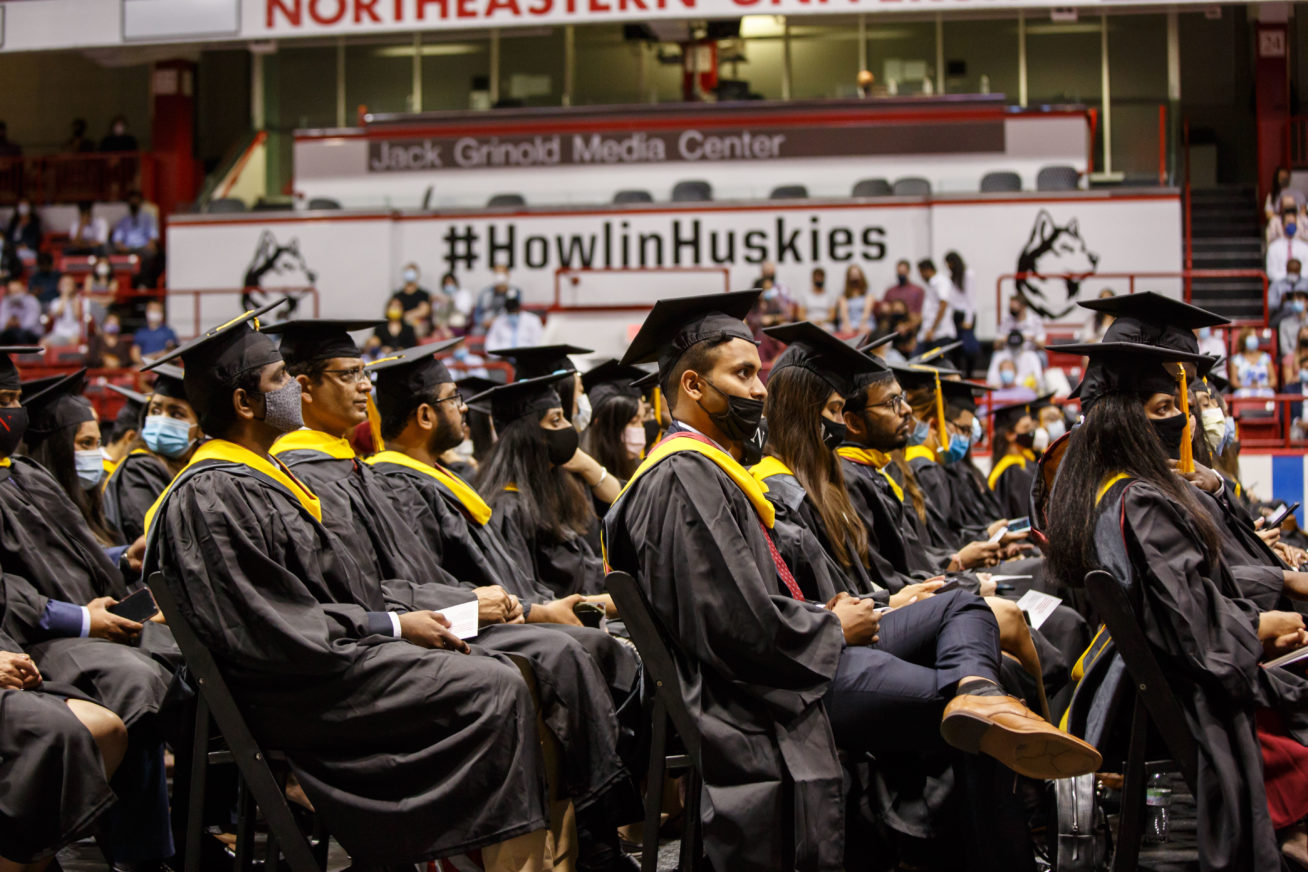
Watch the Ceremonies
The Doctoral Hooding and Master’s Ceremony were livestreamed from Matthews Arena. Click the links below to view the graduation pages and watch recordings of the ceremonies.